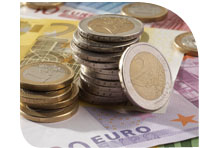|
|

  Euro Trend
What's Next for the Euro? 
The European debt woes rear its head in the aftermath of 2008 financial crisis. Apparently, the Eurozone is facing great challenges that could not be resolved easily in the short term. Indeed currency unification comes with some competitive edges, but in the backdrop of the huge European debt issue, some drawbacks of the single currency are also unveiled.
As the Eurozone shares a common currency, the member states cannot regulate their exchange rates when economic crisis emerges. Normally, the national currency would depreciate when the country's economy went wrong, which in turn boosts the country's competitiveness in the export sector. Lower salaries and cheaper assets which derive from the weaker currency may also attract foreign capital inflow. Meanwhile, the government can regulate the country's economic activities through adjusting its interest rates. Such flexibility does not apply to the member states of the Eurozone, such as Ireland and Greece.
As the financial crisis slowly recedes, the Euro appreciated against the Dollar to 1.5100 from 1.2300 in the midst of the US's Quantitative Easing policy. As the pillar of the Eurozone and benefiting from an extremely low interest rate and a lower exchange rate compared with pre-crisis level, Germany buoys its economy and in turn supports the exchange rate of the Euro. As inflation heats up, the European Central Bank has considered a rate hike in April, which is expected to weigh on the weaker states (at least their debts will be issued at a higher interest rate).
Worse is, some Portugese and Spanish debts are approaching maturity within the first and second quarter of 2011, which brings about worries on refinancing. However, the market's expectation of an even weaker Euro in the first quarter of 2011 followed with its drop in fourth quarter of 2010 comes to nothing. Instead, the market sees a strong rebound of the currency against the Dollar since mid-January to a 1.4520 at peak (and stays at 1.4470 at the time of this writing).
Excluding the weak Dollar, there are two main factors that steadies Euro. First, the member states have respectively announced after the state summit a broader European Financial Stablization mechanism, and a lower interest rate charged with the debts issued to Greece. The market welcomed these policies, regarding them short-term relief to the region. Second, the European Central Bank has announced after its meeting in March to hike rates in April, and 0.25% rate increase was effective as a result, which should support the currency. We expect a stronger Euro relative to other currencies under the rate hike backdrop.
Looking forward, investors who favor Euro should keep an eye on the inflation level in the region, as the European Central Bank will adjust their take on interest rate accordingly, and will in turn reflect on the performance of Euro. Meanwhile, investors shall observe the European Central Banks' response to the external factors like European debt woes and economic impact on the earthquake in Japan and nuclear fallout.
| Source: |
Investment Product Specialist Team
Product Management
Global Treasury Markets (Investment)
Bank of China (Hong Kong) Limited
April 2011 |
Remarks: In case of any discrepancies between the Chinese and English version of this article, the Chinese version shall prevail.
Risk Disclosure:
This document is prepared for reference purpose only. The above views are the personal opinions of the author. The content herein is not intended to provide professional or investment advice and should not be relied upon as such. This document is prepared on the basis of materials obtained from sources believed to be reliable but accepts no liability in relation to the use of this document or the content herein for any purpose. The Bank does not make any representation or warranty and accept no responsibility or liability as to the accuracy, completeness or correctness of the content herein. The content herein is subject to change without notice. You are advised to seek independent financial and professional advice before you trade or invest. You should carefully consider whether trading or investment is suitable in light of your own financial position and investment objectives. This document does not constitute an offer or an invitation to any person to sell, purchase, subscribe or transact any product or service mentioned herein. Investment involves risk. The prices of securities, funds and other investment products may fluctuate, sometimes dramatically. The price of securities, funds and other investment products may move up or down, and may become valueless. It is likely that losses will be incurred rather than profits made as a result of buying and selling securities, funds and other investment products. Past performance is not indicative of future performance. You should carefully read the offering documents for details before making any investment decision. The Bank, its related companies, their directors and/or employees may have positions in, and may effect transaction in, the products and services mentioned herein. Foreign currency investments are subject to exchange rate fluctuations which may provide both opportunities and risks. The fluctuation in the exchange rate of foreign currency may result in losses in the event that the customer converts the foreign currency into Hong Kong dollars or other foreign currencies. Bank of China (Hong Kong) Limited will not be liable for the quality of products and services provided by the participating merchants. The tables and diagrams are for reference only.
|













 Euro Trend
Euro Trend


